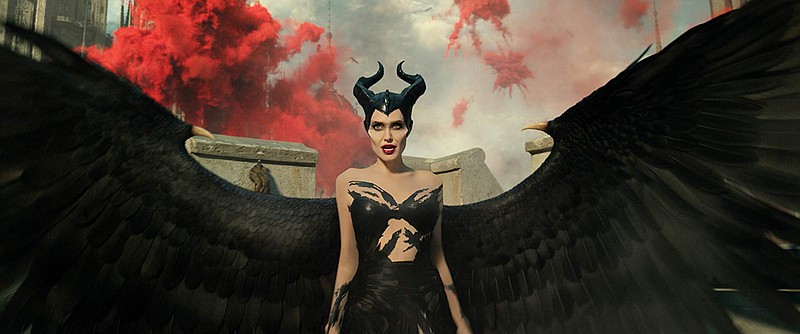Once upon a time, a Hollywood movie didn't have to be so many things to so many people. It didn't have to set a new opening-weekend record, conquer multiple demographics or plant the seeds of a future franchise to be deemed a reasonable success. But times have changed and reasonable has long gone out the window. Witness the bigger-is-better aesthetic that informs even a relatively minor cultural happening like "Maleficent: Mistress of Evil," Disney's follow-up to its 2014 hit "Maleficent," which was itself a live-action spin on the studio's sublime 1959 animation, "Sleeping Beauty."
Not all inflation is bad inflation, to be sure. The new movie, directed by Joachim Rnning from a script by Linda Woolverton, Micah Fitzerman-Blue and Noah Harpster, is yawningly dutiful in some respects and breathtakingly deranged in others. It's a sequel, a rethink, a fairy tale, a battle epic and a showcase for the latest in visual effects and fetish couture, both adorning the frame of the ever-mesmerizing Angelina Jolie. None of that is surprising. But for about 10 to 15 inspired minutes in the first act, the movie also morphs into something less expected: the weirdest "Guess Who's Coming to Dinner" remake you've ever seen.
The bride-to-be is the good Queen Aurora (Elle Fanning), who rules over the Moors, a wild forest populated by a magical menagerie of prickly pixies, sentient mushrooms and walking trees. Aurora's intended is Prince Philip of Ulstead, a nice lad but a bit of a drip (he's played by Harris Dickinson, stepping in for Brenton Thwaites, though you may not notice). The union of two previously at-odds kingdoms looks like a happily-ever-after occasion, at least until Philip's parents extend a royal dinner invitation to Aurora's godmother, Maleficent, who arrives at the castle with her horns politely covered but her wings and fangs bared.
Playing nice doesn't come easily to this rumored-to-be-evil fairy, though it's a lot of fun watching her try. Maleficent flashes a strained, unsettling smile at Philip's parents and tries to ignore the growls and hisses of the royal cat. But from the moment she locks gazes with Philip's formidable mother, Queen Ingrith (Michelle Pfeiffer), it's clear that these two will not be making small talk about wedding gowns and floral arrangements. Naturally, it's only a matter of time before Maleficent blows her horned top and flees Ulstead in a rage and a panic, setting the plot's diabolical convolutions in motion.
As we learned in the first "Maleficent," this mistress isn't really evil; she's just impulsive, ill-tempered and perpetually, tragically misunderstood. (Her wings and horns mark her as one of the Dark Fay, a proud race of fairies we'll get to know better as the story progresses.) The misunderstandings multiply in "Mistress of Evil," as Philip's father, King John (Robert Lindsay), falls victim to a mysterious curse and the treacherous Ingrith seizes power, skillfully inflaming tensions between the human and fairy kingdoms and convincing even Aurora that her fugitive godmother is an enemy of the people.
If that last part makes "Maleficent: Mistress of Evil" sound politically pointed, so does a late speech in which Ingrith extols the benefits of fear-mongering. All will be resolved, eventually, in a flurry of arrows and a clash of swords, though not until after Maleficent herself is waylaid by a lengthy second-act interlude and meets some of her Dark Fay relations (they include Ed Skrein and Chiwetel Ejiofor). You may find yourself wishing she had more to do, though Jolie's poised, nearly silent performance - few actors have extracted as much tension from a single gaze - is as effective as ever, and all the more welcome for its occasional deadpan-comic flourishes.
You see a slightly different Maleficent emerge here: more pensive, vulnerable and at times maiden-like, her wings sometimes draped protectively around her, reinforcing her moral stature in a world that persists in seeing her as a villain. That bold recasting was also the aim of the first "Maleficent," which cleverly and touchingly challenged one of the thematic cornerstones of the Western fairy tale: the adversarial relationship between a good princess and a wicked queen/stepmother/enchantress. It suggested that Maleficent and Aurora, far from being natural enemies, in fact shared a mother-daughter bond so intimate, powerful and boundary-shattering that it had to be sabotaged by the patriarchy - cloaked in a legend that was also a lie.
If "Maleficent" struck a valiant but imperfect blow for multiplex feminism, its box-office victory was a lot more decisive. Like most sequels that exist for chiefly commercial reasons, "Maleficent: Mistress of Evil" isn't a great movie; with its flat dialogue, overblown battles and cloying CGI critters, it's not even a particularly good one. At a certain point, its visual and narrative excesses might remind you of the fantasy-franchise dregs of "The Huntsman: Winter's War," or perhaps an unusually bloodless episode of "Game of Thrones."
But it's also not without its pleasures. You don't cast Michelle Pfeiffer as a scheming, crossbow-wielding queen without getting a lot of grade-A glower for your money. And it's hard not to appreciate the sheer derangement of the plot that Ingrith has concocted, which is so cruel and so elaborate - let's just say it involves a familiar spinning wheel, a deadly pipe organ and biochemical weapons - as to make even the original Maleficent's machinations in "Sleeping Beauty" look tame by comparison. Disney might well have drawn a few more eyeballs by tweaking the title, but "Maleficent: Fairy Apocalypse" probably just didn't have the same ring.
'MALEFICENT: MISTRESS OF EVIL' Rating: PG, for intense sequences of fantasy action and violence, including frightening images. Running time: 2 hours

